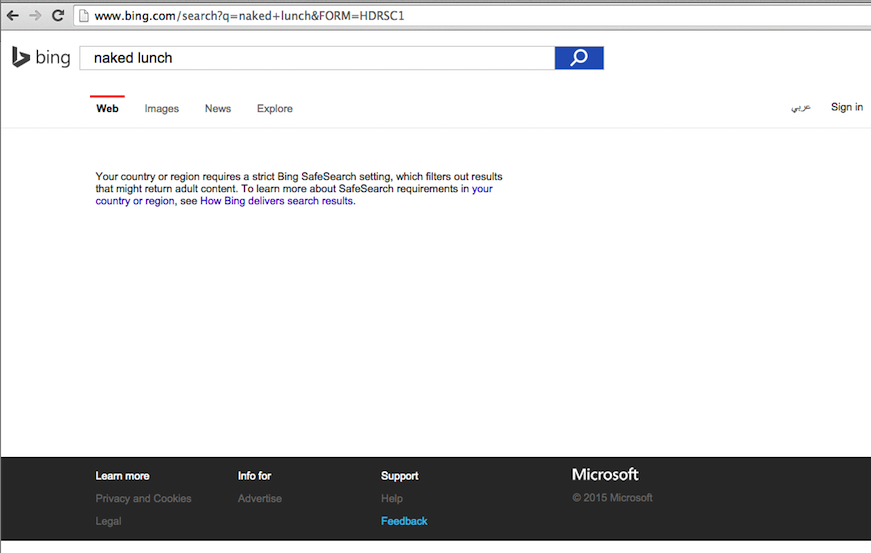Shortly after Microsoft Bing launched in 2009, researchers at the Berkman Center for Internet & Society found that the search engine was enforcing “safe search” in a number of countries, including across the whole of the Middle East and North Africa (or as Microsoft erroneously called the region at the time, the “Arabian countries”). In a paper entitled Sex, Social Mores and Keyword Filtering: Microsoft Bing in “Arabian Countries” [PDF], the researchers claimed that Microsoft was filtering “Arabic and English keywords that could yield sex- or LGBT-related images and content.”1 As a result of the paper, Microsoft pulled back the censorship in certain places and corrected their laughable mislabeling of the region.
Six years later, it seems the censorship is back. Users in some Arab countries2—as well as a handful of other locales—who attempt to search for such a keyword receive a message that reads: “Your country or region requires a strict Bing SafeSearch setting, which filters out results that might return adult content. To learn more about SafeSearch requirements in your country or region, see How Bing Delivers Search Results.”

William S. Burroughs' famous book is among the content censored by Bing
Clicking on that link leads to a page with a long explanation that, at bottom, states (emphasis is mine):
Bing categorizes certain countries as strict markets. In these strict markets, we might restrict the display of adult content (as locally defined), and because of the local customs, norms, and laws, we might limit SafeSearch settings only to "strict." Set to "strict," SafeSearch filters the display of explicit search results in images, videos, and text. Markets that are limited to "strict" include:
China
India
Indonesia
Korea
Malaysia
Middle East
Singapore
Thailand
Turkey
In other words, while in some cases Microsoft may limit search due to legal requests, in other cases, it does so because someone at the company has decided what the local norms or customs of a given country are. This is obviously problematic: Microsoft is going above and beyond the legal requirements of at least some of the countries in the region. Neither Egypt nor Lebanon, for example, block most sexual content or require intermediaries to do so.
What Microsoft appears to be doing is blocking content based on the requirements of the strictest countries in the region. Or as Cory Doctorow put it in an e-mail:
If indeed the House of Saud—for example—demands a high degree of network censorship, then MSFT is acting as a agent of Wahhabism, enforcing the autocratic dictates of a repressive regime against its neighbors simply because they can't be bothered to lift a finger not to.
While a Microsoft representative told me that users in those countries can simply change their market location in their user settings, they shouldn’t have to. There is absolutely no excuse for a company—particularly one that has made commitments to free expression by being a founding member of the Global Network Initiative—to regulate speech beyond that which is required.


